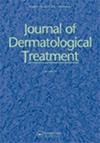Brodalumab efficacy in bio-naïve psoriasis patients: real-life experience of 202 subjects up to 48 weeks.
IF 2.9
4区 医学
Q2 DERMATOLOGY
引用次数: 4
Abstract
Interleukin-17 (IL-17) is central in the pathogenesis of psoriasis (1). Brodalumab was approved in Europe in 2017, and its blockade of IL-17 receptor A provides, in clinical trials, quick onset of action and long-term maintenance of treatment response with a favorable safety profile (2,3). Data regarding real-life use are limited (4–6). We retrospectively assessed efficacy and safety of brodalumab in moderate to severe psoriasis patients attending the Dermatology Clinic of the Turin University Hospital for up to 48weeks. Patients received subcutaneous brodalumab 210mg every 2weeks after the administration of 210mg every week for the first 3weeks. Disease severity at baseline was measured by the Psoriasis Area Severity Index (PASI); PASI improvement of 90% (PASI90) and 100% (PASI100) was recorded at 12, 24, and 48weeks. DLQI response rates were collected at baseline and after 48weeks of treatment. Among 1635 patients on biologics attending our clinic, 202 received brodalumab (Table 1). At week 12, 125 (68%) and 97 (53%) patients achieved PASI90 and PASI100, respectively. At week 24, 93 patients (77%) and 111 (65%) achieved PASI90 and PASI100, respectively. At week 48, 32 patients (78%) achieved PASI90 response, while 39 (64%) had complete clearance. Between baseline and week 48, DLQI improved from a mean of 13.8 to 1.3 (p< .001) and PASI improved from 23.3 to 2.2 (p< .001) respectively). Obesity did not seem to reduce the efficacy or time to onset of action of brodalumab since no difference in efficacy was observed between patients with a BMI above or below 30. No significant differences in efficacy were detected at the different time points between patients with and without joint involvement (Figure 1). Bio-naïve patients improved faster than bio-experienced patients in the first weeks of treatment and at every time point. At week 12, the mean PASI in the bio-naïve population was lower than in the bio-experienced (1.56 vs 2.47; p1⁄4 .045), and more patients achieved PASI 90 and PASI <3 (76% vs 56%; p1⁄4 .004 and 86% vs 69%; p1⁄4 .005). At week 24, more bio-naïve patients than bio-experienced patients achieved PASI90 (84% vs 67%, p1⁄4 .021). Forty-nine patients reported side effects, the most frequent of which were arthralgia (15 patients) in patients without joint involvement at baseline and asthenia (10 patients). Two patients discontinued treatment due to reported side effects, one due to joint pain and one due to a major dental abscess resistant to multiple antibiotic therapies. Brodalumab rapidly improves psoriasis in the first few weeks of treatment, particularly in bio-naïve patients, which is in line with the results of registration studies and previous real-life experience (3,5,6). Performance in bio-experienced patients is also good, as previously reported (5,6). Although not approved in the treatment of psoriatic arthritis, joint involvement does not appear to affect the response to therapy.Brodalumab对bio-naïve牛皮癣患者的疗效:202名受试者长达48周的真实体验
本文章由计算机程序翻译,如有差异,请以英文原文为准。
求助全文
约1分钟内获得全文
求助全文
来源期刊
CiteScore
6.50
自引率
0.00%
发文量
145
审稿时长
6-12 weeks
期刊介绍:
The Journal of Dermatological Treatment covers all aspects of the treatment of skin disease, including the use of topical and systematically administered drugs and other forms of therapy. The Journal of Dermatological Treatment is positioned to give dermatologists cutting edge information on new treatments in all areas of dermatology. It also publishes valuable clinical reviews and theoretical papers on dermatological treatments.

 求助内容:
求助内容: 应助结果提醒方式:
应助结果提醒方式:


